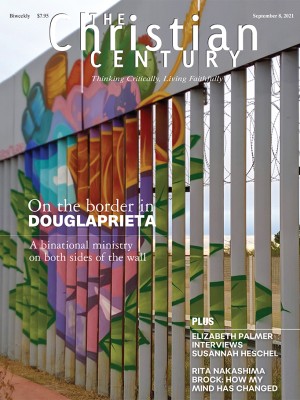Pastoral care is part of Christian formation
A response to Will Willimon and Stanley Hauerwas

Read Willimon and Hauerwas’s conversation and Beverly Roberts Gaventa’s response.
In their conversation about pastoral care (“Wounded by Christ,” Aug. 11), Will Willimon and Stanley Hauerwas make several clear and compelling statements to the church. They rightly lament the separation of the pastoral and prophetic. Hauerwas notes that “words like care, love, and compassion can be self-deceptive when not disciplined and driven by our theological commitments,” and Willimon rebukes pastors who are reluctant to preach against racism because they “don’t want to risk adding to [parishioners’] woundedness.” They call the church to address our society’s growing tendency toward self-absorption. And they challenge believers to accept what Willimon calls “outrageous assignments by Jesus.”
Read our latest issue or browse back issues.
This is welcome counsel. However, the overall tone and content of the conversation falter in three particular ways.
It is imprecise. As I read the article, I couldn’t quite identify the point Willimon and Hauerwas were making—perhaps because they are themselves unsure of their central point. The discussion moves between a wide variety of characterizations of pastoral care, from “the upbuilding of the church by the transformation of our lives” to “being nibbled to death by ducks.” The language of danger and wounds could apply either to the wounds we bring with us (and expect our pastors to address) or the wounds we acquire in the service of the church. Perhaps unintentionally, Willimon and Hauerwas casually conflate the noble and the negative, with the reader struggling to identify the advice they are actually giving.
It is unkind. More precisely, it is sanctimonious, smug, and spiritually secure in the confidence at having gotten it right where others are failing so disgracefully. Pastors “[go] for the low-hanging fruit”; parishioners “have no responsibilities other than those placed upon them by their self-absorption”—these are strikingly harsh statements. To claim that “balance, freedom from anxiety, or a sense of personal well-being” are things that “the Bible doesn’t give a rip about” disregards the very real connections between our mental, emotional, and spiritual lives. And to suggest that the average parishioner’s prepandemic suffering did not qualify as “loss and pain worthy of the ministrations of the church” is simply insulting. Perhaps Willimon and Hauerwas have forgotten Bonhoeffer’s exhortation that a pastor “should never complain about his congregation, certainly never to other people, but also not to God.”
It is inaccurate. It sets up a false conflict between the needs of the parishioner and the needs of the world. Willimon claims that “the trouble starts in seminary. There’s an overemphasis there on self-care, keeping sabbath, and finding emotional support.” Leave aside the detail that keeping sabbath is one of the Ten Commandments. When Willimon states, “Better than self-care is responding to the call to care about what Christ cares about,” he creates a false dichotomy between care of self and care of others—a dichotomy Christian practitioners recognize as false through years of painful experience.
Christine Pohl writes about how the work of Christian hospitality is unsustainable if it fails to “consider the well-being of hosts as well as guests.” She provides from her own experience an example of a church that “collapsed under the weight of ministry. . . . Under the pressure of needs all around us, we were not careful to nourish our own lives, or to put guidelines in place that made sure workers had adequate rest and renewal. Eventually, we were only able to move from crisis to crisis.”
This situation sounds uncomfortably close to the “field hospital” analogy Willimon offers for the church: “those who, having been wounded by their participation in Christ’s mission, are bandaged up so they can be sent right back into the front lines of the battle.” It’s an analogy that ignores the relationship between mission and formation—and formation includes pastoral care. “Being sent on outrageous assignments by Jesus” may require more healing and support than the slapdash attentions a field hospital can provide—that is, unless we view our fellow Christians as mere cannon fodder.
Faithfully accomplishing our outrageous assignments requires us to be as whole and healthy as possible. It also requires us to reckon with our own limitations. While the egotism of contemporary society is often revealed in narcissistic self-absorption, it may also manifest as reckless overconfidence. Ignoring limits usually results in damage to both ministry and minister.
Hauerwas and Willimon seem to have forgotten, within their withering critique of pastoral care, that we are simultaneously receiving care and giving it; we are wounded healers. “Whether there is a discipline of pastoral care or pastoral theology matters little,” says Hauerwas. But their conversation seems to indicate the opposite: that an intentional, theologically grounded understanding of pastoral care is precisely what is needed in the church today.






